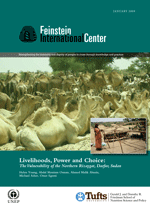Livelihoods in Darfur are intimately linked to the conflict, none more so than the livelihoods of the camel herding nomads known as the Northern Rizaygat. Their notoriety as part of the Janjaweed militia has obscured from view how their lives and livelihoods have been affected by conflict.
Based on fieldwork in rural Darfur, this report uses a livelihoods lens to illustrate the processes that have contributed to the vulnerability of the Darfuri nomads who have much in common with pastoralists globally. Severe pressures on pastoralist livelihoods have contributed to ‘maladaptive’ livelihood strategies that are often linked to violence and conflict, and undermine the livelihoods of both victims and perpetrators.
They have suffered relative exclusion and vilification by the international community, including by humanitarians, international peace processes and international advocacy. Apart from their politicized image, other reasons for their exclusion are because they are widely perceived by the international community as less vulnerable, and also because they are hard-to-reach, living in scattered rural communities and alienated by their treatment internationally.
This report challenges the widely held misperceptions about their vulnerability and presents a detailed series of recommendations. Lessons learned from this very specific case from Darfur are critical for a lasting peace and have much wider regional and international policy implications.







